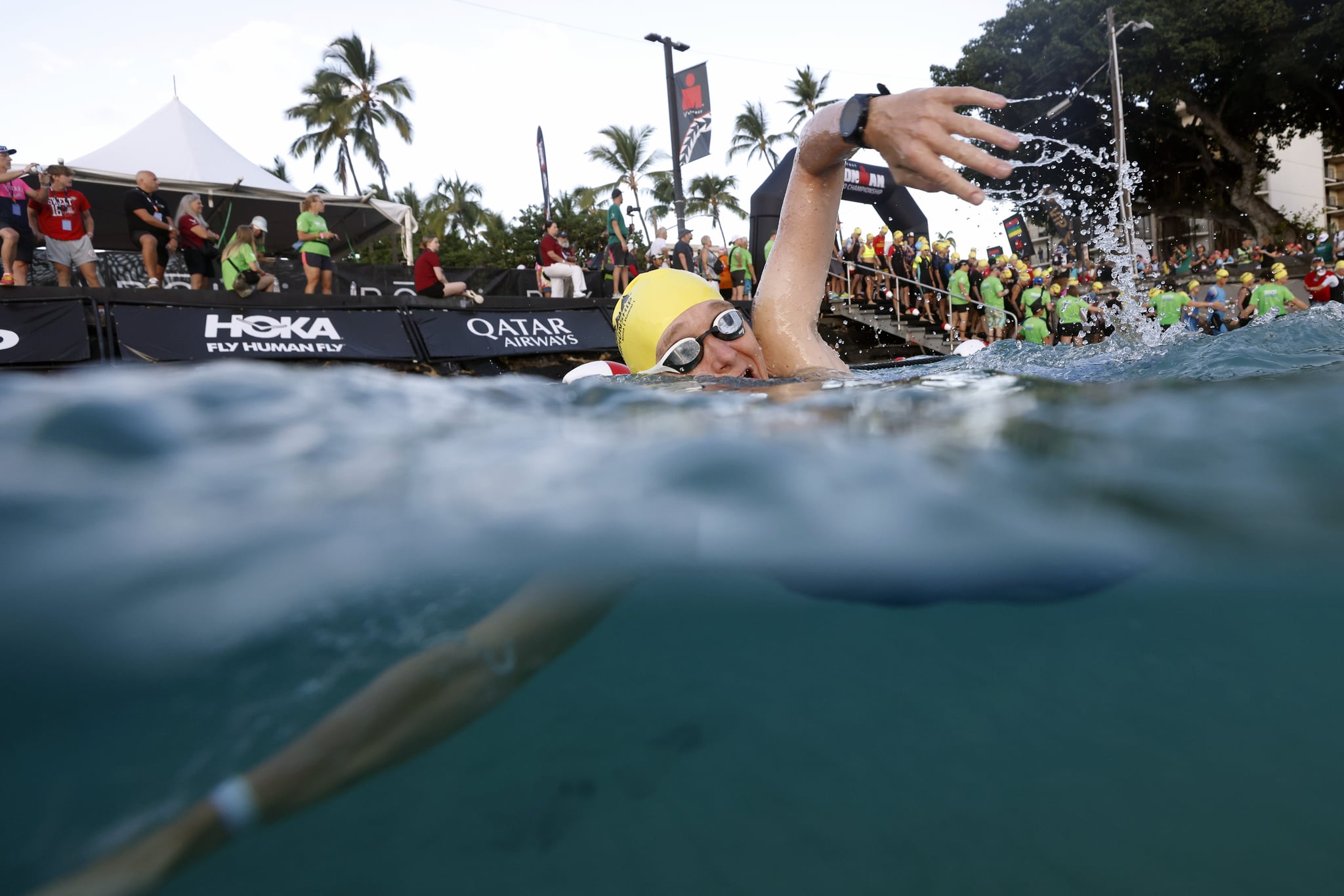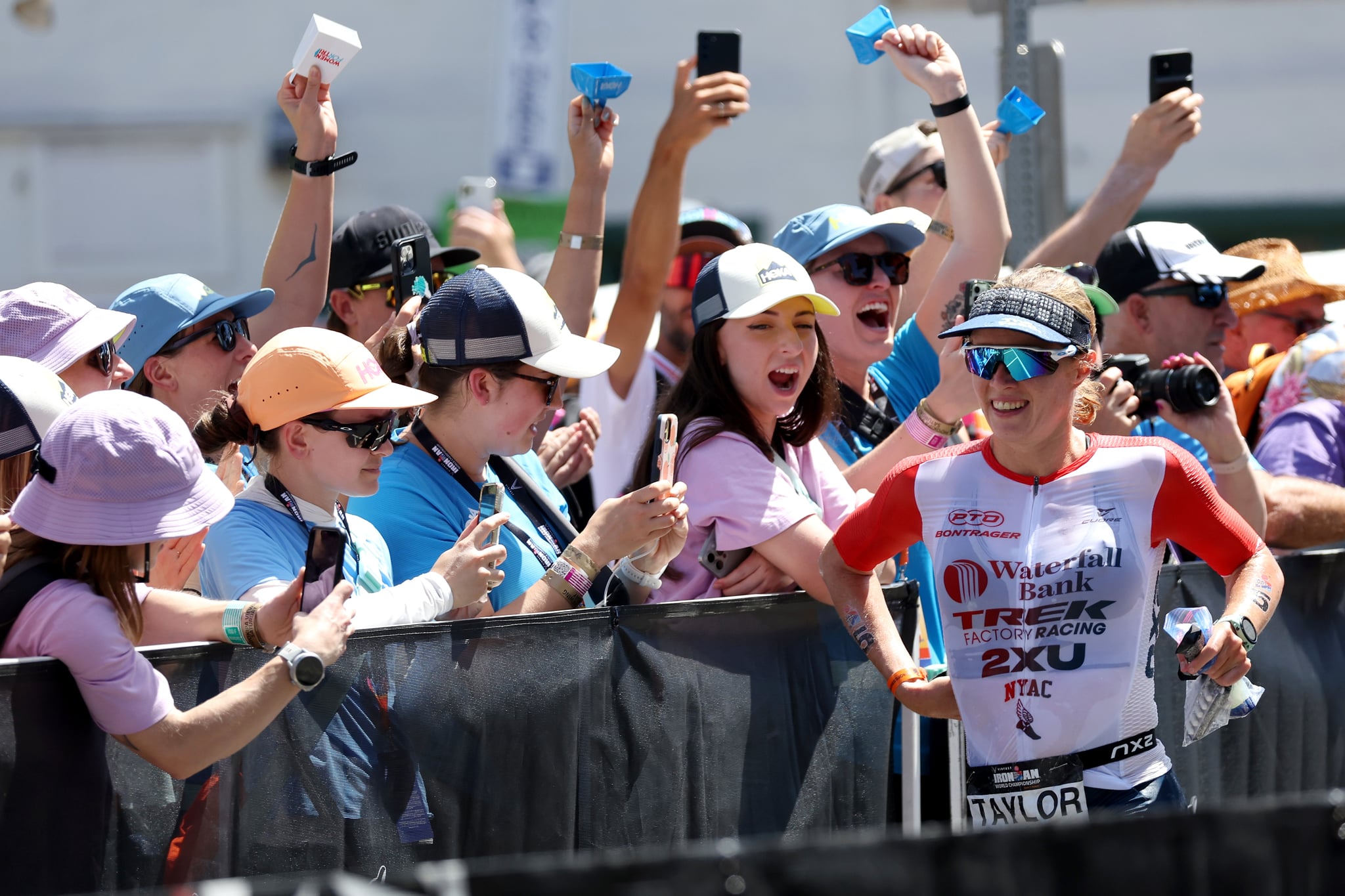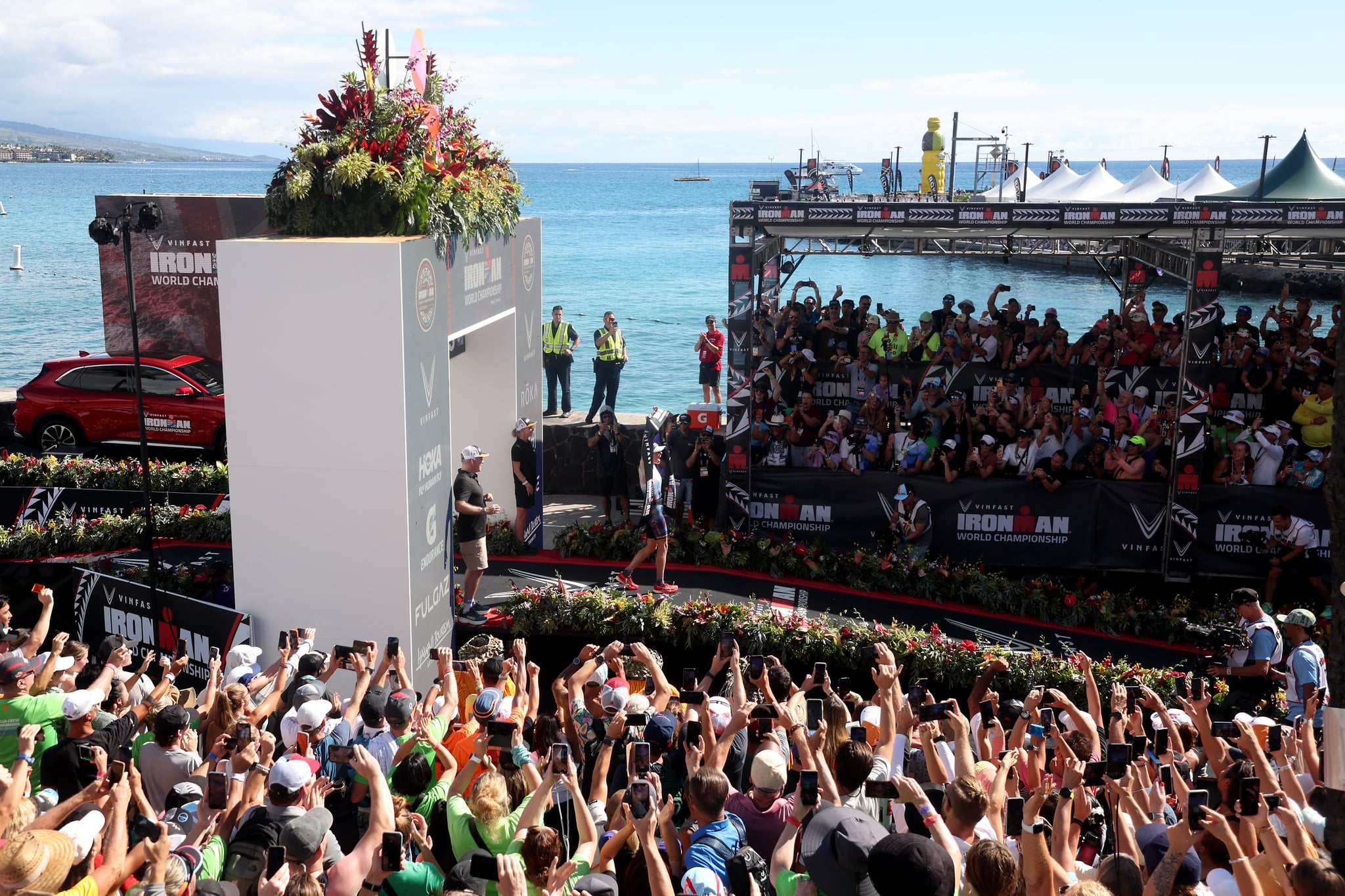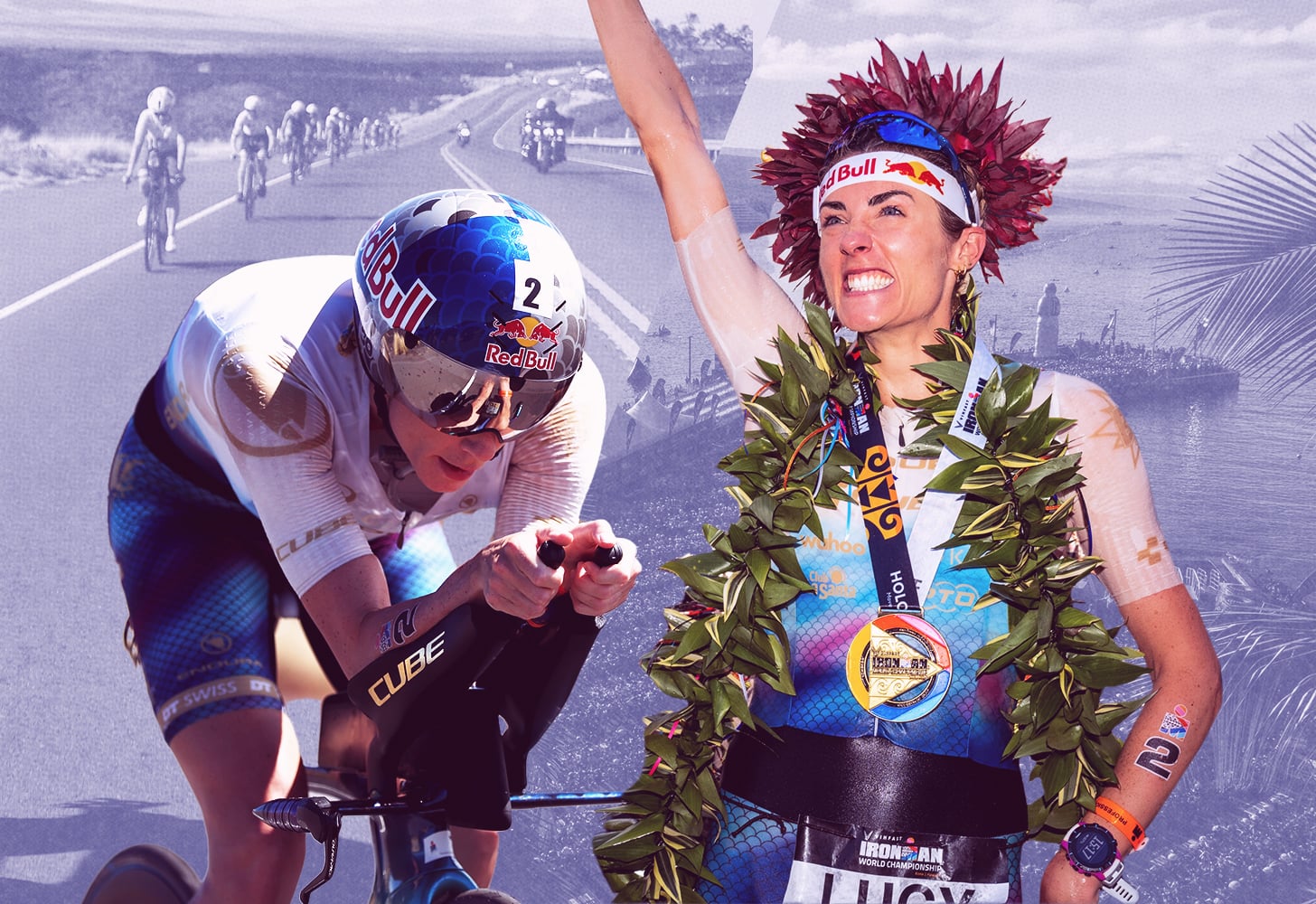Image Source: Getty / Donald Miralle; Christian Petersen; Sean M. Haffey
Image Source: Photo illustration: Ava Cruz
As the sun rose over the Island of Hawaii on Oct. 14, more than 2,000 women triathletes splashed into Kailua Bay to begin the 2023 Ironman VinFast World Championships. A grueling challenge lay ahead of them — 2.4 miles of swimming, 112 miles of biking, and 26.2 miles of running — but the vibes were immaculate. Dancing, high-fiving, and singing along to “Girls Just Want to Have Fun” as they waited to enter the water, you would never know they were heading out to compete against one another for up to 17 hours.
You could credit the energy to the idyllic location or the pre-race adrenaline pumping through the athletes’ veins, but I think a major factor was that, for the first time ever, only women would be on the course.
For more than 40 years, the Ironman World Championships have been held in Kailua-Kona, HI, and hosted both women and men. The race kicks off with professional athletes, and they’re followed by amateurs who’ve qualified by racing (and, usually, winning) other Ironman events. The start times are staggered, and results are grouped by age and gender, but everyone is out there on the same course, at more or less the same time.
In 2022, Ironman tried a new approach: the Championships took place over the course of a weekend, with men and women competing on separate days. Unfortunately, double the races meant a huge increase in participants and spectators, and the small Hawaiian community struggled to host the thousands of people flocking to Kona.
This year, Ironman decided to completely separate the championships for the first time, leading to a historic women’s-only race in Kona. The men competed in their own World Championship in Nice, France, in September. (They’ll switch next year, with the women racing in Nice and the men in Kona.)
“To see a woman crossing the finish line first — not just intermixed with the elite age-group men who happened to be up there with her, but to be the first to cross the line, be the first at the turn around — I think that was really important.”
Heading to the Mediterranean instead of Hawaii may not sound like a hardship, but because the Kona race has such a meaningful history, the decision to send the men to Nice symbolized the organization’s commitment to supporting its women athletes. “We decided that we wanted to make a bet on the women,” Andrew Messick, Ironman CEO, tells POPSUGAR.
Ironman has been a leader in advancing gender equality in sports — thanks in part to the fact that one of the sport’s founding athletes was a woman. Partners Judy and John Collins created the Hawaiian Ironman Triathlon, the first-ever 140.6-mile triathlon, in 1978, and a woman raced for the first time the following year. (Compare this to the Olympics, where women weren’t allowed to compete in the marathon until 1984.) The organization has offered equal pay since its first race with a prize pool, in 1986, making Ironman one of the first professional sports to do so. Both women and men have always competed against the same cutoff times and distance, too.
Even with this legacy, Messick says, “It hasn’t been until recently that we’ve started to really think more deeply about what [we] need to do to support women’s racing. . . . To advance that, if we were going to have the first-ever all-women’s Ironman World Championship, it should happen in Kona. This is the place to do it.”
The end result, frankly, blew everyone away.
If You Build It, They Will Come
While the Ironman Group has always compensated its men and women participants equally, the patriarchal nature of our culture means men (especially in the pro field) often overshadow women in terms of sponsor attention and media exposure. With a limited number of spots in the Ironman race, it also means that for every man on the course, one fewer woman can compete (and vice versa), Messick says.
For the women pros, being on the same course as the men has performance implications, too. When you have both men and women on the race course, to flow the race appropriately, you generally need to start the pro men, then the pro women, wait a while, and then start general age-group men after that, Messick says. “And what you find — and what is inevitable, operationally — is that the fastest women run into the back of the men’s field and the fastest age-group men run into the back of the women’s field. And it creates dynamics in racing that nobody particularly likes.”

Image Source: Sean Haffey/Getty Images for IRONMAN
It’s more than distracting: pro racers have different rules, including strict penalties for drafting during the bike portion (when you bike behind someone else in order to use them as a human windshield). When a pro is racing in the same mix with age-group athletes, that can be harder to police.
“In the past, having had men on the course at the same time, it would actually significantly influence the outcome of the women’s race,” says professional triathlete and Hoka athlete Sarah Crowley, who raced Kona for the sixth time this year. By separating the men’s and women’s World Championships, there’s significantly less interference. “When you get out of the swim [portion], it’s like a solo race for you and everyone else. . . . I think it’s really good because whoever is crowned the champion has definitely done it on their own.”
The 2022 iteration of the race attempted to solve for these problems, but it didn’t serve the women as well as the organizers had hoped.
“What we’d hoped for was a day in which just women raced in Kona,” Messick says. But at the same time, the men were still there, having raced just the day before, and the media spotlight and the conversation were still about both men and women. The 2023 iteration is, “in many ways, more true to our original intention, which is women truly being the only beneficiary of the global triathlon spotlight,” he says. Because the men’s championships wrapped in the middle of September, the last few weeks of buildup — and the entire focus of the Kona race itself — had been on the women.
And it was a resounding success. Leading up to the race, all anyone could talk about in the global triathlon community was which of the 46 pro athletes would win, Messick says.
Handing over the entire race to women also meant that more amateur athletes could compete. Typically, an amateur has to win their age group in another Ironman race to qualify for the World Championships, Messick says. This year, athletes who placed second, third, or fourth in other events may have also had the opportunity to come to Kona. In the end, more than 2,000 women raced in Kona this year, up from 1,300 last year and 700 to 800 from when the race was a single day with mixed-gender divisions.
The race also saw the highest single-day finisher rate of any Ironman World Championship in race history, with more than 97 percent completing the race.
More Than a Vibe Check
Welcoming only women athletes in Kona resulted in a distinct vibe shift. “There’s this really powerful but totally different energy than when it’s men and women. It’s a totally different energy from Nice, where we all were five weeks ago,” Messick says. “Just a lot less testosterone.”
Sara Whittingham, MD, a doctor at the Cleveland Clinic and longtime Ironman racer who competed at Kona, felt the difference of the women-only race firsthand. “I may have been a little bit cynical going in, like: ‘We don’t need our own race, we’re good.’ But I realize now how hugely impactful it was for our sport and women’s sports in general,” she tells POPSUGAR. “To see a woman crossing the finish line first — not just intermixed with the elite age-group men who happened to be up there with her, but to be the first to cross the line, be the first at the turn around — I think that was really important.”
Without the men, there was less terse competitiveness and “get in my way, I’ll run you over” energy, Dr. Whittingham says, and people were instead more encouraging and positive overall.

Image Source: Christian Petersen/Getty Images for IRONMAN
“Sometimes, in some of these bigger races, people tend to get worked up and excited,” she says. “With the women, people were excited, but people were excited for each other and wanting each other to do well, too, which was just awesome.” Even the athletes in the highly competitive pro field echoed the sentiment, cheering for each other’s success despite vying against one another for the World Champion title.
As Messnick pointed out was true for the pre-race hype, the pros also appreciated that they didn’t have to vie for media attention. “Having only the women here, it forces the media attention on the women’s race, which we haven’t seen,” Crowley says. Every journalist, photographer, interview, and press conference was focused on them, as was the broadcast of the race, which typically bounced between tracking the men and women pros.
And the audience is there. Viewership of women’s sports has been growing in recent years, with the 2023 FIFA Women’s World Cup bringing in record numbers and the 2023 WNBA finals setting a 20-year viewership high. Interest in Ironman seems to be following this trend: Google search data around the World Championship was significantly higher for 2023 than during the previous two mixed-gender championships in 2022 and 2019.
“It’s an amazing time to be a female athlete in this sport . . . and the field we had in this race today is kind of credit to that,” Lucy Charles-Barclay, who took home first at this year’s championship, said in the post-race press conference. “There’s no men here taking the limelight. We had a whole day of coverage, across the world, just for female athletes.”
Gender Equality in Ironman — and What Lies Ahead
Ironman has long been ahead of the curve as far as equality goes, but participation in Ironman events still skews heavily toward men. “Women’s participation in our sport has a long way to go,” Messick says.
Women make up about 30 percent of participants in Ironman 70.3 (a “half” Ironman) and only 20 percent at full-distance Ironman races, Messick says. This is compared to the company’s 5K races (which are 65 percent women), half marathons (60 percent women), and marathons (45 percent women). “It’s clear as day that there is an appetite for women to do ambitious endurance events. Yet the longer the race goes, the fewer women participate,” he says. “How do you start changing that dynamic? That is, I think, one of the big things that we have an opportunity to play a part in.”

Though more can certainly be done to foster equity and inclusivity, the first all-women Ironman World Championship is a big step forward. Watching woman after woman cross the finish line in Kona — and hear the trademark congratulations of “You are an Ironman” boom across the speakers with each successful finish — is an undeniably powerful experience, but even more impressive was seeing an entire community rally around women athletes in the way they deserve.
“The finish line is just such a special place,” Dr. Whittingham says. “To get there, you have to sacrifice so much, and there are so many obstacles, and so many things have to go right to make it to the finish line.”
The only thing that could make the finish line better at the women’s World Championships, in my humble opinion? To hear, instead, “You are an Ironwoman.”
Image Source: Christian Petersen/Getty Images for IRONMAN
